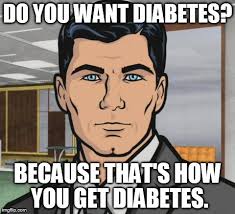The effect depends on the fruit. Apples, for example, contain sucrose, glucose (dextrose), and fructose. Remember that a sucrose molecule consists of a glucose molecule bonded to a fructose molecule.
The fructose has no effect on either serum glucose or serum insulin, because it is metabolised in the liver. The sucrose is cleaved immediately into its two moieties, and all the glucose in the apple enters the bloodstream straightaway. The fructose is transported by the portal vein directly to the liver.
The effect of glucose on insulin is well-known to anyone who hangs around these forums. The effect of fructose on the liver is documented by Robert Lustig, M.D., Ph.D., who has published books and given many lectures (recorded and available on YouTube) on fructose metabolism. The problem with fructose is the low rate at which the liver can handle it. Stay below that level and everything is fine; exceed it, and the liver starts making and storing fat droplets, which is the beginning of visceral adiposity and hepatic insulin resistance. Fructose also travels to the brain and messes with the reward centre (nucleus accumbens) and the dopamine pathway, which is why sugar has an addictive effect on about 20% of the population. This is all basic science.
Dr. Lustig maintains that whole fruit, with all the fibre it contains, is safe to eat, because the fibre slows down the rate of absorption of the fructose to what the liver can handle. Fruit juice, on the other hand, slams the liver, because the fibre has all been destroyed in the juicing process. No one can eat enough apples fast enough for the fructose to be problematic, but a glass of apple juice dumps all the fructose and glucose into our body practically at once. We also know which fruits are the highest in fibre, namely blueberries and strawberries; low-sugar fruits such as olives and avocadoes are also fine. Nuts are iffy.
Sugar/carb addicts are well advised to be extremely careful with their sugar intake, even while staying below their carb limit. I doubt that a very occasional apple, orange, or peach is going to ruin anyone metabolically, but it’s not worth risking a binge, if one is vulnerable. Nor is it worth giving oneself fatty liver disease from eating too much fruit. (Since ethanol and fructose are metabolised by the same pathway in the liver, alcoholic fatty liver disease and non-alcoholic fatty liver disease are actually the same condition. I’m not sure there is any point in retaining the distinction. The cure in both cases is to stop stressing the liver with alcohol and fructose. And to keep that carbohydrate intake low!)
There is some question about how much fruit our ancestors ate, and how much sugar it used to contain back then. Don’t believe either side of the debate; I don’t believe it’s possible to know. In any case, it is not likely that our ancestors got sweetness in any quantity, over the two million years of human evolution, and fruit is available only for a short time of the year in most climates.
Interesting fact: the executives who ran the sugar plantations in the eighteenth and nineteenth centuries were noticeably more afflicted with metabolic problems than the slaves who worked the fields, because sugar cane is very woody, so the slaves who gnawed the canes got comparatively little sugar, whereas the bosses were allowed the finished product. Diabetes, gout, and liver disease used to be the privilege of the upper classes, until the development of modern refining methods in the late nineteenth century brought the cost of white sugar, white flour, and white rice within reach of the poor.




















